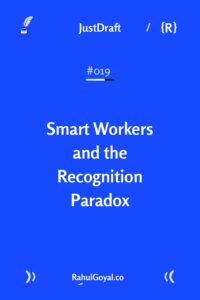How Recognition Impacts Workload Management
Ever felt like you’re either drowning in tasks or left with nothing to do? If you’re both smart and hardworking, people around you might perceive you as being in one of two states: super busy or super free.
Here’s the catch: the outcome often depends on whether your efforts are recognized by managers or the organization.
One Topic: Recognition Shapes Your Workload
The Two States
- Super Busy: When your abilities are recognised, managers tend to assign you more tasks. You’re trusted to deliver, and while it’s rewarding, it can also lead to exhaustion.
- Super Free: If your potential goes unnoticed, you finish tasks efficiently and find yourself with too much idle time. This can feel isolating or even demotivating.
Both situations stem from the same qualities—smartness and hard work—but the difference lies in external recognition. So how can you navigate these extremes?
Practical Ways to Navigate the Busy-Free Paradox
- If You’re Overburdened:
-
- Set Boundaries: Politely discuss your workload with your manager.
- Prioritize Wisely: Focus on high-impact tasks first.
- Delegate: Share tasks with your team, if possible.
- If You’re Underutilized:
- Upskill: Use free time to learn something new.
- Seek Feedback: Proactively ask for more responsibilities.
- Increase Visibility: Showcase your work to ensure it’s noticed.
Organizational Takeaways
For managers and organizations, recognizing employees fairly and distributing workloads effectively can prevent extremes. Encourage open communication and regularly assess workloads to maintain balance.
By being proactive in managing recognition and responsibilities, you can create a more balanced work environment—whether you’re the employee or the leader.
Read last week’s JustDraft newsletter about the Power of Incremental Progress
Two Quotes
The way to get started is to quit talking and begin doing.
Success is not final, failure is not fatal: it is the courage to continue that counts.
One Passage From A Book
“In the beginner’s mind there are many possibilities, but in the expert’s mind there are few. The beginner is open to all potential solutions, free from rigid expectations, and eager to learn. By contrast, the expert might rely on established methods, sometimes missing innovative opportunities. This openness in beginners fosters creativity, flexibility, and learning. Shunryu Suzuki writes, ‘If your mind is empty, it is always ready for anything; it is open to everything. In the beginner’s mind there are many possibilities, but in the expert’s mind there are few.’ Cultivating a beginner’s mind means approaching each moment as fresh and full of opportunity.” — Zen Mind, Beginner’s Mind by Shunryu Suzuki

